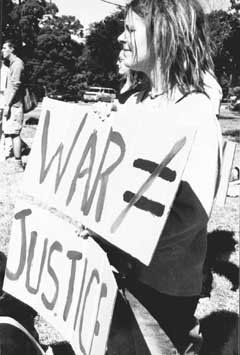The man in the black pick-up truck was not happy to see the 50-some Guilford students who lined the intersection of West Friendly Ave and Guilford College Road. “George Bush rules!” he yelled angrily out his window.
The demonstrators, peace symbols in hand, smiled and waved.
It was noon on Monday, Oct. 8, and a last-minute advertising campaign had convinced many Guilford students and several professors to walk out of their classes and stand in silence at the edge of campus.
The vigil, one of several held since Sept. 11, was organized in reaction to the bombings of Afghanistan that began on Sunday.
“What the U.S. government is doing right now is not going to lead to peace,” said Mel Keiser, Professor of Religious Studies, who attended the demonstration. “We need to break the spiral of violence.” Keiser stressed that there has been a long history of Guilford faculty participation in peace vigils.
For many students, however, the walkout on Monday was a new sort of experience. “I’ve never held a sign like that before,” said senior Amanda Wheeler. “It was scary, the way people were looking at [us] with complete hatred.”
Keiser attributed the negative reactions of some passers-by to a failure to understand the “importance of critical reflection” in a democratic society, and added that not everyone seemed to disapprove. “A number people gestured their appreciation for what we were doing,” he said.
Even some students on campus, however, had concerns about the way the vigil was organized. Senior Sara C. Hudgins criticized the way that flyers about the event encouraged students to walk out of classes. “I’m in class to learn,” she said. “I’m not going to leave my learning environment. How can you respectfully stand up and walk out of class?”
Other students wondered whether or not their efforts would really make any difference. Would driving past a sign reading, “justice, not war,” really change the mind of the average Greensboro resident? And if it did, would that event really have any impact on national or international policy?
In response, Keiser pointed out the example of the peace marches that occurred during the Viet Nam war. It was only afterwards, he said, that anyone knew how important they had been.
“Sometimes you’ve got to do what you’ve got to do,” he said, “regardless of the known effects.”

